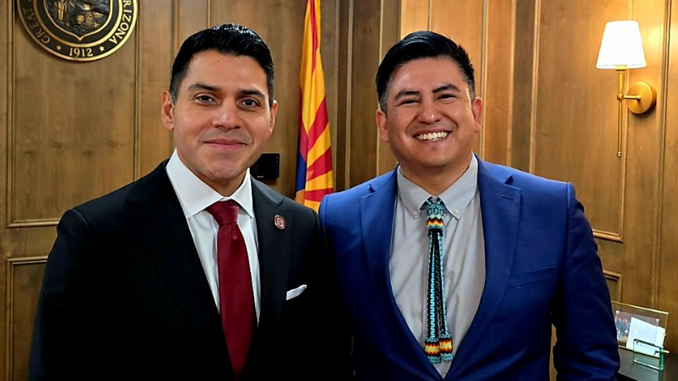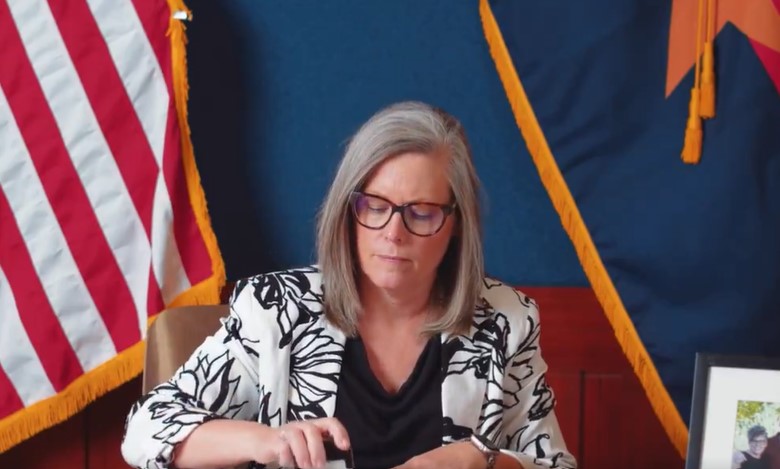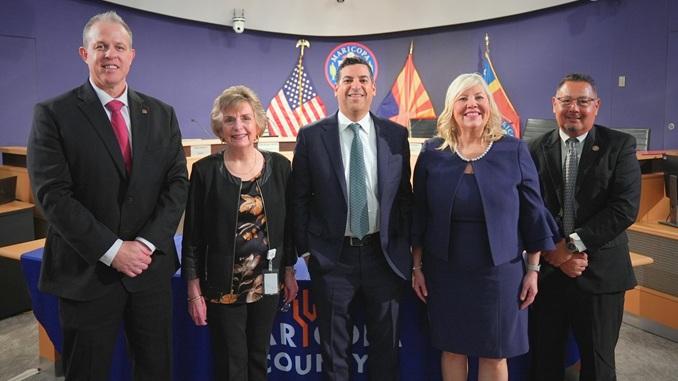
by Staff Reporter | Feb 16, 2026 | Education, News
By Staff Reporter |
The lone conservative voice for the Phoenix Union High School District (PXU) governing board resigned on Friday.
Jeremiah Cota blamed “unfounded and baseless attacks” by the rest of the board against him for his resignation. Cota said the district suffered “gross maladministration and injurious governance” and a “fiscally unsustainable path” under the rest of the board.
“I have been stunned to see how this board and district have engaged in a pattern of harassment and discrimination against fellow community and board members, including the baseless and unfounded accusations against myself,” said Cota. “As an enrolled member of the federally recognized San Carlos Apache Tribe, the outright persecution I have experienced as a board member from other members and direct personnel have jilted my relationships, caused damage and irrefutable harm, and created a toxic operating environment for both personal and professional endeavors.”
Cota was appointed to the board in June by the Maricopa County School Superintendent. Prior to his appointment, Cota worked for Reps. Paul Gosar and Andy Biggs.
Since being on the board, Cota has called public attention to a number of causes for concern within the district: increased violence following rejection of campus officers and contracts with left-wing activist groups, to name a few.
Last fall, the board was hit with significant budget reductions and staff layoffs over the steep decline in enrollment. District leadership, apart from Cota, blamed school choice and Republicans for their budget shortfalls.
Activists launched a campaign for his removal over his attendance at a Christmas party with fellow conservatives following Turning Point USA’s annual AmericaFest in December.
Secular AZ organized a petition that began circulating last month calling for Cota’s resignation, picked up by local media. Over 600 people signed the petition. Secular AZ also created social graphics to complement their campaign against Cota.
Board President Francisco Pastor-Rivera signaled support for the petition in interviews.
“As a board member, you represent making decisions that impact a student’s future. I think this attendance itself, and this action shows true colors all together,” said Pastor-Rivera. “I really question if a person is representing the values of the community that they serve.”
Cota inspired the ire of district leadership about a month after joining the board when he declined to recite a land acknowledgment statement, instead offering a prayer to God. Cota later went a step further and requested to remove the land acknowledgement statement entirely.
The board parliamentarian prevented Cota from finishing his prayer and told him that religious prayer could not occur before the land acknowledgment statement.
The denial of Cota’s commitment to a public display of his Christian faith spurred a legislative response in the form of House Bill 2110.
One of the leaders of Secular AZ and repeat political candidate for various offices, Jeanne Casteen, accused Cota of indoctrination in media interviews.
“They shouldn’t have been praying in the first place. If you want to pray, you can do it before the meeting and silently,” said Casteen.
More recently, Cota led the lone charge on the board to take disciplinary measures against staff who participated in anti-ICE protests on campus.
AZ Free News is your #1 source for Arizona news and politics. You can send us news tips using this link.

by Matthew Holloway | Feb 16, 2026 | News
By Matthew Holloway |
The Arizona Senate is advancing two measures to strengthen protections for property owners and close gaps in the state’s deed recording process. Senate Bill 1479 advanced through the Senate Regulatory Affairs and Government Efficiency Committee with a 5-2 “Do Pass” recommendation on Wednesday. Senate Bill 1254 advanced from the Senate Finance Committee in late January.
Senate Bill 1479, sponsored by Senate Majority Whip Sen. Frank Carroll (R-LD28), would establish new identification and documentation requirements intended to deter fraudulent property transfers. According to the official bill text, the legislation would require individuals who submit deeds in person to present valid government-issued photo identification to the county recorder, though the recorder would be prohibited from retaining or copying that identification.
The bill would also require county assessors to establish a voluntary notification system alerting property owners to changes in ownership or mailing address associated with their parcel. Additional provisions strengthen affidavit requirements for certain real estate filings and mandate that notaries obtain thumbprints in their journals for specified real property documents.
“Property ownership is the cornerstone of financial security for families, seniors, and small businesses in Arizona,” Sen. Carroll said in a statement. “When criminals are able to forge documents, record false claims, or quietly transfer property without the rightful owner’s knowledge, it erodes trust in our entire system. These bills deliver a strong message: Arizona will not tolerate deed fraud. We are enhancing identity verification, increasing penalties for offenders, improving notification systems, and ensuring that no property changes hands without proper approval. This initiative aims to protect homeowners, restore confidence in our public records, and ensure that the law firmly supports legitimate property owners.”
SB 1479 would increase the criminal penalty for knowingly recording a forged instrument affecting real property, reclassifying the offense as a Class 4 felony.
A separate measure, SB 1254, sponsored by Sen. J.D. Mesnard (R-LD13), addresses deed acceptance requirements. Under current Arizona law, a deed must be signed by the grantor, acknowledged before a notary, and recorded to transfer real property. The bill would amend A.R.S. § 33-401 to require documented acceptance by the grantee before a deed may be recorded.
SB 1254 would allow acceptance to be demonstrated either through the grantee’s signature on the deed or by attaching a certificate or resolution of acceptance. The measure advanced from the Senate Finance Committee with bipartisan support.
The legislation comes amid ongoing concerns about deed and title fraud in Arizona. In 2022, then-Arizona Attorney General Mark Brnovich warned Arizonans of an increase in deed fraud reports, noting that his office had received 65 homeowner complaints from Jan. 2021 to August 2022. In December 2025, the Phoenix Business Journal reported that vacant land parcels were the primary targets in 2024 real estate fraud schemes that cost Arizonans nearly $50 million.
Sindy Ready of the Arizona Realtor Association told AZ Family in December, “In Arizona, many times. it’s out-of-state owners that have these properties that think it’s down the road they’re going to build a second home on the property.” Speaking to the outlet, Jeff Cayton, a Valley realtor with a decade in Arizona property sales, said, “The fraud is running rampant right now. The land fraud is very big, and I’ve experienced this multiple times, as well as my team members and people in my company.”
Matthew Holloway is a senior reporter for AZ Free News. Follow him on X for his latest stories, or email tips to Matthew@azfreenews.com.

by Matthew Holloway | Feb 16, 2026 | News
By Matthew Holloway |
Arizona lawmakers approved a Republican-sponsored bill granting full property tax exemptions to veterans with a 100% service-connected disability, advancing the measure with bipartisan support before it was signed into law last week.
The bill, HB 2792, was approved unanimously by the Arizona House and moved through the Senate as SB 1268 with near-unanimous support before reaching the governor’s desk. The House measure was sponsored by Majority Leader Carbone (R-LD25). Senator David Gowan (R-LD19) sponsored the corresponding legislation in the Senate.
According to Senate records, the sole dissenting vote was cast by Democratic Senator Sally Ann Gonzales, who represents Legislative District 20.
Under the legislation, a veteran determined by the U.S. Department of Veterans Affairs to have a 100% service-connected disability will qualify for a full property tax exemption on their primary home. The exemption also extends to surviving spouses, provided they remain in the residence and do not remarry.
“This bill keeps a simple promise,” Carbone said in a statement. “If a veteran sacrifices their health in service to America, the government should not tax them out of their home. We worked directly with county assessors to ensure the law is clear and properly implemented. Preserving homeownership for those who earned it is central to the House Republican Majority Plan and to preserving the American Dream. This law delivers direct relief, limits government reach, and stands up for veterans and their families.”
The change codifies and expands existing law that previously provided partial exemptions based on disability percentage and income limits. State personal exemption programs already allow a reduction in assessed value for certain disabled veterans, widows, and widowers, and can result in full relief in some cases.
In a post to X, Senate GOP leaders wrote, “Arizona Republicans are fighting to eliminate property taxes for veterans with 100% service-connected disabilities. SB 1268 and HB 2792 deliver full property tax relief on their primary residence. These men and women gave everything for our country. The least we can do is make sure they can stay in their homes.”
County assessors across the state have begun notifying eligible residents of the change and encouraging veterans and surviving spouses to file applications for the exemption through their local assessor’s offices. For example, the Santa Cruz County Assessor’s Office states that the new law is effective for the 2026 tax year and details documentation requirements, including VA disability certification and proof of property ownership.
Applications for individual exemption programs generally must be filed with county assessor offices by the February 28 deadline, according to the Maricopa County Assessor’s Office. This deadline may be extended to September 1 with an approved Exemption Deadline Waiver.
Speaking to reporters on Thursday, Carbone said, “This is about fairness. It’s about honoring service, and it’s about ensuring the most vulnerable among us can remain in their homes with dignity and integrity.”
The legislation brings Arizona in line with property tax relief policies in several other states that offer full or partial exemptions for disabled veterans on their primary residences.
Matthew Holloway is a senior reporter for AZ Free News. Follow him on X for his latest stories, or email tips to Matthew@azfreenews.com.

by Ethan Faverino | Feb 15, 2026 | News
By Ethan Faverino |
Governor Katie Hobbs has vetoed a Republican bill, HB 2785, which would have brought Arizona’s income tax law into full conformity with the federal Internal Revenue Code as reflected in the tax forms already issued by Hobbs’ Department of Revenue for the 2025 tax year.
The legislation, passed on February 11, 2026, aimed to protect Arizona taxpayers from uncertainty, the need for amended returns, potential penalties, and mid-season rule changes during the ongoing filing season.
By aligning state statute with the guidance taxpayers are currently following, HB 2785 would have prevented widespread disruption and costly refiles for Arizonans.
The action comes after Governor Hobbs vetoed an earlier Republican tax conformity package that included targeted relief measures—such as no tax on tips or overtime, deductions for seniors, and replacements for the federal SALT deduction with expanded child tax credits and childcare expense deductions.
Following the first veto, the Governor’s administration issued tax forms assuming full federal conformity (including provisions like deductions for qualified tips, overtime pay, certain vehicle loan interest, and additional charitable contributions for standard deduction filers), while repeatedly declining to clarify her position or support changes.
Department of Revenue testimony highlighted the risks of reversing course now, potentially forcing up to one-third of filers to submit paper-only amended returns, incur additional filing costs, and face unexpected tax liabilities months later.
In a press release, House Speaker Steve Montenegro stated, “Arizona taxpayers did exactly what the government told them to do, and the Governor left them exposed. Her Department of Revenue issued tax forms, told people not to delay filing, and testified that changing course would cause massive disruption. Then the Governor vetoed the Legislature’s solution and refused to explain what comes next.”
“That is the opposite of leadership,” added Montenegro. “The House and Senate acted because families, seniors, and small businesses should not be forced to pay penalties, refile returns, or owe unexpected taxes because the executive branch could not get its act together.”
Ethan Faverino is a reporter for AZ Free News. You can send him news tips using this link.

by Matthew Holloway | Feb 15, 2026 | News
By Matthew Holloway |
Arizona State Representative Nick Kupper (R-LD25) has introduced a constitutional measure that would ask Arizona voters to decide whether the right to refuse medical mandates should be enshrined in the state Constitution.
Last week, Kupper filed House Concurrent Resolution 2056 (HCR 2056), which, if approved by the Legislature and later by voters, would place a proposed constitutional amendment on the ballot for the next general election.
The resolution would prohibit government entities from “mandating, requiring, coercing, or compelling an individual to accept or receive a medical product or treatment” as a condition of employment, education, access to public facilities, participation in services, or the exercise of any right or benefit.
The proposal defines coercion or compulsion to include penalties, denial of benefits, or other adverse consequences tied to refusing a medical mandate. It also includes exceptions preserving existing authorities, such as court-ordered treatment when a person poses a danger to themselves or others; parental rights in making medical decisions for minors; emergency medical care when consent cannot be obtained; lawful criminal investigations; compliance with federal law; and existing state requirements for diagnostic tests and procedures.
The text of the resolution states directly: “The right to refuse medical mandates is hereby recognized and protected as a fundamental and inherent right of every individual.”
In a statement included with the release, Kupper said the resolution is intended to give voters the opportunity to decide whether medical mandates should remain within the government’s authority. He also stated that the resolution would not prevent the state from “promoting vaccines, offering treatment, responding to emergencies, or providing care,” but said it would “draw a firm line against force and punishment.”
“Across multiple administrations and on both sides of the political divide, we have seen government officials assert sweeping authority over individual medical choices through threats to livelihoods, careers, and basic freedoms,” Kupper explained. “I nearly lost my career and Air Force retirement for refusing an unapproved medical mandate. No elected official or bureaucrat should ever have the authority to force a medical procedure on a free citizen. This resolution gives the people of Arizona the opportunity to decide for themselves whether that power should exist.”
He added, “This is about freedom and informed consent. Adults should be able to make decisions about their own bodies, and parents should have the final say for their children. That principle should not change based on who is in power or what crisis is being used to justify control.”
In a post to X, Kupper wrote, “Arizonans deserve the opportunity to decide for themselves if they want the government to continue controlling their medical decisions or if they want to reclaim their bodily autonomy.”
If HCR 2056 is approved by the Arizona Legislature, the measure would be placed on the ballot for a statewide vote at the next general election.
Matthew Holloway is a senior reporter for AZ Free News. Follow him on X for his latest stories, or email tips to Matthew@azfreenews.com.

by Staff Reporter | Feb 15, 2026 | News
By Staff Reporter |
The Maricopa County Board of Supervisors is divided on moving forward with a pathway that may result in the recorder’s removal, even with little time left before the primary election.
The board published a statement Wednesday announcing their vote requiring Recorder Justin Heap to provide a written report and sworn public testimony on February 18.
The board statement accused Heap of “lying to the public” and stonewalling the board.
“He has been unreliable. He has been unprofessional. He has been untruthful. He has been unaccountable,” read the statement. “The Board cannot responsibly set a budget, make policy decisions, or oversee county operations, including an active election in Tempe right now, without complete and truthful information from Mr. Heap.”
The board made its decision during its formal meeting on Wednesday. State law authorizes the board to require any county officer to make reports under oath concerning office duties.
The written report would address key issues identified in Chair Kate Brophy McGee’s letter to Heap last month concerning expenditures and prepayments, signature verification and curing, and the special election board and deputy registrar program.
Heap will also be required to provide the identities of the provisional voters his office said were disenfranchised; records of requests by his office for federal funds, legislative appropriations, or county funds; communications with the Maricopa County Attorney’s Office concerning the distribution of mail-in ballots to voters who didn’t request them in the 2025 special election in Congressional District 7; and records of the reassignment of the space in the Maricopa County Tabulation and Election Center from the Maricopa County Sheriff’s Office to his office.
Although the supervisors voted unanimously to impose these requirements on Heap, not all supervisors supported the official statement condemning Heap.
Supervisor Mark Stewart said the statement wasn’t approved by him. Not only that, Stewart said, but the remarks were disrespectful and potentially damaging to current negotiations with Heap.
“We are in active negotiations on the Shared Services Agreement, and my focus remains on reaching a constructive resolution that delivers results for the people we serve,” said Stewart.
Other supervisors fanned the flames of the statement.
Supervisor Debbie Lesko shared her remarks from Wednesday’s meeting, in which she said she endured over a year of frustrations with Heap. Lesko lodged multiple accusations against Heap, such as that he had something to hide.
“I feel Recorder Heap has left us no alternative,” said Lesko.
The only alternative for the board would be to continue negotiations with the recorder’s office through public discussions and the court.
This pathway by the board may lead to the largest county in the state and fourth-largest county in the nation without its elections leader with a few months left to go before elections begin. The primary election was moved up from August to July recently.
Should Heap refuse to comply with Wednesday’s order, the board may opt to remove the recorder from office with just five months to go before the primary elections.
This latest action by the board appears to be their response to the Maricopa County Superior Court striking down the board’s attempt to subpoena three staff members within Heap’s office. This court restraining order occurred within the case initiated by Heap last summer to restore elections powers to his office.
AZ Free News reached out to Heap regarding the board’s decision. As of this report, no response has been received.
AZ Free News is your #1 source for Arizona news and politics. You can send us news tips using this link.






